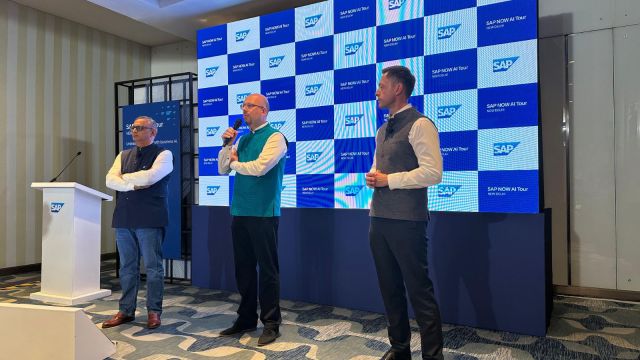© IE Online Media Services Pvt Ltd
Latest Comment
Post Comment
Read Comments
 (left to right) Manish Prasad, President and MD, SAP India Subcontinent; Oliver Beck, Chief Technology Officer, SAP Sovereign Cloud; and Martin Merz, President of Sovereign Cloud. (Express Image)
(left to right) Manish Prasad, President and MD, SAP India Subcontinent; Oliver Beck, Chief Technology Officer, SAP Sovereign Cloud; and Martin Merz, President of Sovereign Cloud. (Express Image)German software giant SAP on Friday, September 19, announced the launch of sovereign cloud capabilities in India, enabling its customers to store data locally in the country.
The company said that its ‘Sovereign Cloud’ offering will help governments and regulated industries modernise their infrastructure with cloud and AI while retaining full control over sensitive data. It also said that SAP Sovereign Cloud has been launched in compliance with India’s National Information Security Policy & Guidelines (NISPG) prepared by the Ministry of Home Affairs (MHA) for securing data under the control of government bodies, public sector organisations, and associated entities.
SAP’s announcement comes amid the Centre’s aggressive efforts to make India a global hub for data centres and AI infrastructure. It also comes as the IT Ministry prepares to finalise data protection rules to operationalise the Digital Personal Data Protection Act, 2023.
Data localisation refers to regulatory actions that result in the restriction of data flow within the boundaries of a jurisdiction.
Earlier this year, The Indian Express reported that data localisation norms had made a comeback in the draft rules proposed by the IT Ministry. The draft DPDP Rules, 2025, propose that the kind of personal data allowed to be processed by significant data fiduciaries (like Meta, Google, Apple, and other major tech companies) will be determined by a central government-formed committee subject to the restriction that such personal data is not transferred outside Indian territory.
“With SAP Sovereign Cloud in India, we are proud to support the country’s path as a growing hub for innovation—offering customers freedom of choice to embrace cloud and AI while retaining full control over data and operations,” Martin Merz, President, SAP Sovereign Cloud, said at a press briefing in New Delhi on Friday.
“The launch of SAP Sovereign Cloud in India underscores our unwavering commitment to the nation’s digital transformation journey. By ensuring data remains secure, compliant, and within sovereign boundaries, we are enabling India’s regulated industries to innovate fearlessly,” Manish Prasad, President & Managing Director, SAP Indian Subcontinent, said.
The concept of digital sovereignty has continued to gain momentum amid rising geopolitical tensions that has pushed countries like India to rethink its dependence on foreign data storage and cloud services providers.
The artificial intelligence boom has also led countries around the world to rapidly develop on-shore computing infrastructure needed to train and run powerful AI systems. In response, major global tech players such as SAP, Amazon, and Microsoft are rolling out sovereign cloud initiatives to ensure the data of users is stored within that country or region. Earlier this year, OpenAI also decided to enable local data storage for its customers in India by launching a data residency programme.
With SAP Sovereign Cloud, customers will gain access to a full-stack framework to meet their infrastructure, platform, applications, and AI needs. Built on an open-source foundation, SAP claims to guarantee flexibility while enabling customers to maintain technical, operational, and legal control of their data.
Customers can also choose from a range of deployment models, including SAP Sovereign Cloud on-site in customer data centres, and a hyperscaler option developed in partnership with Amazon Web Services (AWS), the company said.
SAP also announced that it is setting up a Sure Operational Facility that has been “purpose-built to meet the stringent requirements of India’s national security authorities.” This facility will be located within the newly inaugurated, 41-acre campus at SAP Labs India Innovation Park in Bengaluru, Karnataka.
SAP generates a majority of its revenue from cloud services and is focused on leveraging AI to drive efficiencies for businesses. The company offers enterprise products across cloud solutions, expense management, supply chain management, and analytics.
Its products are used by over 4,40,000 customers worldwide, including 98 of the world’s 100 largest companies. Taken altogether, its client base generates over 80 per cent of global commerce, according to the company. SAP has over 17,000 employees spread across Bengaluru, Pune, Mumbai, Hyderabad, and Delhi in India. Over 40 per cent of the 53-year-old company’s global R&D workforce is in India.